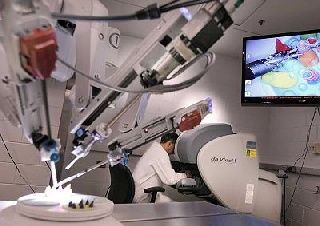Robotic surgery for kidney cancer has emerged as a new and promising technique for the treatment of this disease. Kidney cancer is the eighth most common cancer in both men and women, with approximately 76,000 new cases diagnosed in the United States each year. In recent years, robotic surgery has gained popularity as an alternative to traditional open surgery for the treatment of kidney cancer. This essay will explore the benefits of robotic surgery for kidney cancer, the different robotic systems available, and the potential drawbacks of this technique.
Robotic surgery for kidney cancer involves the use of a robotic system to assist the surgeon in performing the surgery. This system consists of a console where the surgeon sits and controls the instruments attached to robotic arms, which are inserted into the patient through small incisions. The robotic system provides the surgeon with a three-dimensional view of the surgical site, allowing for greater precision and control during the procedure.
One of the primary benefits of robotic surgery for kidney cancer is its minimally invasive nature. Compared to traditional open surgery, which requires a large incision in the abdomen or flank, robotic surgery involves smaller incisions. This leads to less blood loss, less pain, and faster recovery times for patients. Additionally, the robotic system allows for greater precision during the surgery, which can lead to better outcomes for the patient.
Another benefit of robotic surgery for kidney cancer is its potential to preserve kidney function. In traditional open surgery, the surgeon may need to remove the entire kidney to ensure that all cancerous tissue is removed. However, with robotic surgery, the surgeon can more precisely target the cancerous tissue and remove only the affected portion of the kidney, leaving the healthy tissue intact. This can be especially important for patients with pre-existing kidney disease or those who have only one functioning kidney.
There are several different robotic systems available for the treatment of kidney cancer. The most commonly used system is the da Vinci robotic system, which has been FDA-approved for use in kidney surgery since 2002. This system consists of a console where the surgeon sits and controls the instruments attached to robotic arms, which are inserted into the patient through small incisions. The da Vinci system provides a three-dimensional view of the surgical site and allows the surgeon to control the instruments with greater precision than traditional laparoscopic surgery.
Another system used for robotic surgery in kidney cancer is the Zeus robotic system. This system was developed in the late 1990s and is similar to the da Vinci system in its use of robotic arms controlled by a surgeon at a console. However, the Zeus system has fallen out of favor in recent years due to its limited range of motion and lack of availability in many hospitals.
The potential drawbacks of robotic surgery for kidney cancer include the cost and the need for specialized training for the surgeon. Robotic surgery can be expensive, and the cost may not be covered by all insurance plans. Additionally, not all hospitals have access to robotic systems, which can limit the availability of this technique for patients.
Another potential drawback is the need for specialized training for the surgeon. Robotic surgery requires a different set of skills and knowledge compared to traditional open surgery or even laparoscopic surgery. Surgeons must receive specialized training in order to use the robotic system effectively and safely. This can be a barrier to widespread adoption of robotic surgery for kidney cancer, as not all surgeons may have access to the necessary training.The use of AI in robotic surgery for kidney cancer can potentially enhance the precision and accuracy of the procedure. AI algorithms can analyze medical images to identify and highlight potential cancerous tissue, allowing the surgeon to more precisely target and remove the affected tissue. Additionally, AI can assist in real-time decision-making during the surgery, helping the surgeon to adjust the surgical plan as needed.
VR can also play a role in the future of robotic surgery for kidney cancer. VR simulations can provide a safe and controlled environment for surgeons to practice and improve their skills. This can be especially useful for surgeons who are new to robotic surgery or who want to learn new techniques. Additionally, VR simulations can allow surgeons to plan and rehearse complex procedures before performing them on a patient, potentially reducing the risk of complications.
While the benefits of robotic surgery for kidney cancer are promising, it is important to note that this technique is not appropriate for all patients. Patients with advanced kidney cancer or those with certain medical conditions may not be candidates for robotic surgery. Additionally, as with any surgical procedure, there are risks associated with robotic surgery for kidney cancer, including bleeding, infection, and damage to surrounding tissue.
In conclusion, robotic surgery has emerged as a promising technique for the treatment of kidney cancer. The minimally invasive nature of this technique, along with its potential to preserve kidney function, make it an attractive option for patients. While the cost and need for specialized training may limit its availability, advancements in technology, such as the use of AI and VR, may make robotic surgery more widely available in the future. As with any surgical procedure, it is important for patients to discuss the potential risks and benefits of robotic surgery with their healthcare provider to determine if it is the right option for them.






